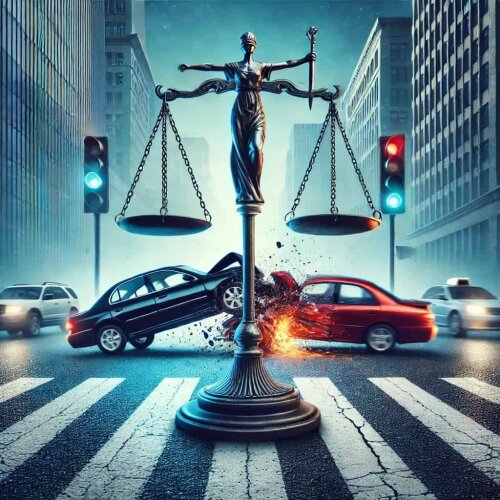Best Accidents & Injuries Lawyers in Portland
Share your needs with us, get contacted by law firms.
Free. Takes 2 min.
List of the best lawyers in Portland, United States
United States Accidents & Injuries Legal Articles
Browse our 1 legal article about Accidents & Injuries in United States written by expert lawyers.
- What to Do After a Serious Car Accident in the US: A Legal Step-by-Step Guide
- Call 911, get medical help, and do not admit fault. Photograph the scene, vehicles, and your injuries, and get witness names and the officer's report number. Report the crash to your insurer quickly. In no-fault states, PIP deadlines are short (e.g., Florida requires initial treatment within 14 days; New York... Read more →
About Accidents & Injuries Law in Portland, United States
This guide explains the basics of accidents and injuries law for people in Portland, United States. If you were hurt in a car crash, bicycle or pedestrian collision, slip and fall, workplace incident, or by a defective product, civil law and administrative systems provide ways to seek medical coverage, recover financial losses, and hold responsible parties accountable. Cases often involve insurance companies, police and medical records, local and state regulations, and sometimes government agencies. Knowing how the system works in Portland can help you protect your rights and make informed decisions after an injury.
Why You May Need a Lawyer
Many injury cases can be straightforward, but other situations benefit greatly from legal help. Common reasons to consult a lawyer include:
- Serious or catastrophic injuries that cause long-term disability, significant medical bills, or lost earnings.
- Complex liability issues, such as crashes involving multiple vehicles, shared fault, or unclear cause.
- Disputes with insurers that deny or undervalue claims, delay payment, or pressure you to accept a low settlement.
- Workplace injuries where workers compensation benefits are disputed or where a third party may also be liable.
- Claims against a government entity or public agency, which often have different notice rules and shorter deadlines.
- Wrongful death cases where family members seek compensation for loss of support and other damages.
- Product liability or premises liability cases that require investigation, expert testimony, and preservation of evidence.
Even for less severe injuries, an initial attorney consultation can clarify your rights, timelines, and reasonable settlement value so you can make better decisions.
Local Laws Overview
Portland is subject to both municipal ordinances and the laws of the state where it is located. Key legal concepts and local items to be aware of include:
- Statute of limitations - Civil claims for personal injury are subject to filing deadlines. These deadlines can vary by type of claim and by whether a government entity is involved. Missing a deadline can bar your claim, so consult an attorney promptly.
- Comparative fault - Recovery in many injury cases may be reduced by your percentage of fault. If you were partly responsible, the damages you can collect may be adjusted accordingly.
- Insurance framework - Most injury claims are resolved through insurance. Auto liability, uninsured and underinsured motorist coverage, homeowners or renters liability, and employer workers compensation insurance all play roles in different accident types. Insurance policy terms, limits, and exclusions matter.
- Workers compensation - Injuries at work are generally handled through the workers compensation system, which provides medical care and wage replacement in most cases. Workers compensation can limit the ability to sue your employer, but third-party claims may still be available.
- Premises and product liability - Property owners and product manufacturers may be liable when unsafe conditions or defects cause injury. Portland property owners also must follow local codes related to sidewalks, lighting, and property maintenance.
- Local traffic and bike-pedestrian rules - Portland has active pedestrian and bicycle communities and specific local policies governing crosswalks, bike lanes, parking, and street design. Crash reports, traffic camera footage, and local enforcement practices can affect case development.
- Government claims - If a city agency, public transit operator, or other government entity may be responsible, special notice requirements and shorter filing timelines often apply. Following these rules precisely is critical.
Frequently Asked Questions
How long do I have to file a personal injury claim after an accident?
There are strict deadlines known as statutes of limitations. Many personal injury claims must be filed within a limited time period after the injury. The exact deadline depends on the type of claim and whether a government entity is involved. Because missing a deadline can prevent recovery, contact an attorney soon after your injury to confirm the applicable timeline.
Do I need a lawyer for a minor injury?
Not always. Minor injuries with few medical expenses and no lost wages can sometimes be handled directly with the insurance company. However, even minor injuries can have hidden complications. An attorney can help evaluate whether the insurer is offering a fair settlement and protect your interests if symptoms later worsen.
How much will hiring an injury lawyer cost me?
Most personal injury lawyers work on a contingency-fee basis, which means the lawyer is paid a percentage of any settlement or verdict. If there is no recovery, you usually do not owe attorney fees, though you may be responsible for certain case expenses. Always ask about fees, expenses, and how they will be handled before signing a retainer agreement.
What if I was partly at fault for the accident?
Partial fault does not always bar recovery. Under comparative fault principles, your damages may be reduced by your share of responsibility. The exact effect depends on local law. An attorney can help assess fault and develop strategies to minimize your percentage of responsibility.
What should I do if the at-fault driver has no insurance?
If the other driver is uninsured or underinsured, your own uninsured or underinsured motorist coverage may provide benefits. You may also have other potential recovery avenues, such as claims against a liable third party. An attorney can evaluate the insurance situation and help pursue available options.
How does workers compensation affect my right to sue?
Workers compensation typically provides benefits for medical care and wage replacement for on-the-job injuries, and in many cases prevents you from suing your employer in tort. However, you may be able to file a third-party claim if someone other than your employer caused the injury. Consult a lawyer experienced in workplace injuries to explore all options.
How are damages calculated in an injury case?
Damages often include medical expenses, lost wages, loss of earning capacity, pain and suffering, and sometimes punitive damages in cases of extreme misconduct. The specific elements and methods of calculation vary by case. Documentation of medical treatment, employment records, and expert opinions are commonly used to support damages.
Do I have to give a recorded statement to the insurance company?
Insurers may request recorded statements. You are not required to give one, and doing so without legal guidance can sometimes hurt your case. It is reasonable to provide basic facts but avoid detailed recorded statements until you understand the implications and have consulted an attorney.
Should I accept the first settlement offer?
Insurance companies often make early offers that may be lower than the claim is worth. Before accepting any offer, make sure you understand the full extent of your injuries, future medical needs, and non-economic damages. A lawyer can evaluate offers and negotiate for fair compensation.
How long will my case take to resolve?
Case duration varies widely. Minor claims may settle in weeks or months. Complex or disputed cases can take a year or more, and a trial can extend the timeline further. Your lawyer should provide a realistic estimate based on the facts, the need for expert testimony, and the positions of the parties involved.
Additional Resources
Below are agencies and organizations that can be useful when dealing with accidents and injuries in Portland, United States:
- Local law enforcement agencies for accident reports and immediate incident response.
- Portland Bureau of Transportation for information on street design, bike and pedestrian infrastructure, and crash data within the city.
- State department of motor vehicles for vehicle registration and driving record issues.
- State workers compensation agency for questions about employer-provided benefits and appeals.
- State bar association for lawyer referrals and information about attorney qualifications.
- Legal aid organizations and pro bono clinics for low-cost or free legal help if you qualify.
- Consumer protection agencies for product safety complaints and recalls.
- Local hospitals and trauma centers for medical care and records needed in claims.
- Advocacy groups focusing on traffic safety, pedestrian and bicycle rights, and disability support for community resources and rehabilitation guidance.
Next Steps
If you have been injured and need legal assistance, follow these practical steps:
- Seek immediate medical attention. Your health is the top priority, and medical records are key evidence for any claim.
- Report the incident to police or relevant authorities if appropriate, and obtain a copy of the accident report.
- Preserve evidence - take photos of the scene, your injuries, vehicle damage, and any hazardous conditions. Keep contact information for witnesses.
- Notify your insurance company as required by your policy, but be cautious about detailed recorded statements before consulting a lawyer.
- Track all medical treatment, expenses, lost time from work, and other accident-related costs in a dedicated file.
- Contact an experienced accidents and injuries attorney for an initial consultation. Bring medical records, the accident report, photos, insurance information, and any correspondence from insurers.
- Ask potential lawyers about their experience with similar cases, fee structure, estimated timeline, and strategy for proving damages and fault.
- If you need immediate or low-cost help, consider local legal aid organizations or the state bar lawyer referral service.
Acting promptly preserves your legal rights and gives you the best chance to obtain fair compensation. A qualified attorney can explain your options and guide you through each step of the process.
Lawzana helps you find the best lawyers and law firms in Portland through a curated and pre-screened list of qualified legal professionals. Our platform offers rankings and detailed profiles of attorneys and law firms, allowing you to compare based on practice areas, including Accidents & Injuries, experience, and client feedback.
Each profile includes a description of the firm's areas of practice, client reviews, team members and partners, year of establishment, spoken languages, office locations, contact information, social media presence, and any published articles or resources. Most firms on our platform speak English and are experienced in both local and international legal matters.
Get a quote from top-rated law firms in Portland, United States — quickly, securely, and without unnecessary hassle.
Disclaimer:
The information provided on this page is for general informational purposes only and does not constitute legal advice. While we strive to ensure the accuracy and relevance of the content, legal information may change over time, and interpretations of the law can vary. You should always consult with a qualified legal professional for advice specific to your situation.
We disclaim all liability for actions taken or not taken based on the content of this page. If you believe any information is incorrect or outdated, please contact us, and we will review and update it where appropriate.
Browse accidents & injuries law firms by service in Portland, United States
Portland, United States Attorneys in related practice areas.










